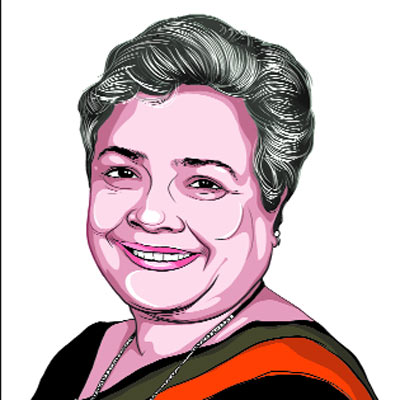

Dec 11, 2024 16:01 IST First published on: Dec 11, 2024 at 15:18 IST
It’s a crazy but extremely popular idea — to have a brass band lead a crowd of noisy, colourful and, at times, inebriated men and women accompanying the bridegroom to the bride’s house. After all the rituals the priests and the family elders have put everyone through, the inane jokes and the paunchy uncles dancing like teenagers feel rather cathartic. Perhaps those caught in the jam caused by the procession would be cursing, even honking, angrily, but in the minds of the baraatis this musical spectacle supersedes everything. They bring out paper money to felicitate the dancers and encourage the band, and present it with a flourish to the band master.
Before colonial rule, Indian kings and princes went to war routinely accompanied by a posse of drummers and trumpet players. Over time, dancing girls and singers were added to the royal armed brigades. The prudish British frowned on the inclusion of courtesans and eunuchs in the Queen’s native army. A large number of musicians and dancing girls were sent packing. In post-1857 India, the sahibs built churches and started schools but men’s wars remained incomplete without music. So by 1918, brass bands and bagpipers taught to play British martial tunes were introduced into all army regiments posted in the hills.
Most musicians and makers of arms patronised for centuries by the native rulers had no choice but to seek other native patrons. Many moved to the Rohilla dominant foothills of the Himalayan region and in the belt from Roorkee to Bareilly, they used their inherited, and considerable metallurgical skills to manufacture brass copper and steel goods. Towns like Meerut, Bareilly and Moradabad thus became big-time makers of goods from scissors and padlocks to major exporters of components for brass bands internationally.
In several other areas, the brass bands under the leadership of erstwhile musicians began offering their services for a price during joyous occasions like weddings, the birth of a son and funerals of centenarians who had enjoyed a full life. The musically inclined hill folk were charmed by bands accompanying the Kumaon and Garhwal regiments on all ceremonial parades, resplendent in red and gold gear. Let’s have our own bands they felt.
On the eve of India’s Independence, one Sagir Ahmed of Nagla village in Badayun district, a trained player of wind instruments, fell in love and married a girl from the Pithoragarh district in the hills. To enable his pahadi wife to visit her family more easily, he moved to Haldwani at the foothills of the Himalayas. There, he formed a brass band group and named it after their firstborn Altaf. Thus the famous Altaf band of Kumaon, without which no wedding procession was considered elitist enough, came into being. Soon local trumpet players, drummers and players of mashaq been (bagpipes) were rendered uncool. Baraat for a groom from any well-to-do family had to have the Altaf band. It was a status symbol which came at a price. But so what?
Marching with wedding processions in the hills was much more stressful than marching in the plains with an army. The terrain determined the rates of the bands. It was during one such event that Altaf Master, born to a shehnai player lover in 1947, is said to have collapsed with a massive heart attack.
most read
After Altaf, his younger brother Talib Husein created the Azad Band. The members of this group met in the orchards facing the local zenana hospital to practice new ditties, mostly from Hindi films that were becoming a rage. By the late 70s, the police and army bands were much sought after by powerful bureaucrats and politicians to celebrate family weddings.
Today, the manufacturing and export of brass musical instruments is a flourishing industry stretching from Moradabad to Pudukottai. In the fiscal year 2020-21, India exported musical instruments worth $19.39 million. The US was the biggest importer followed by Germany, the UAE, Indonesia and the Netherlands.
Today, the Indian Armed Forces have more than 50 brass bands, 400 pipe bands and a corps of drums. It has produced legendary bandmasters. Growing up in post-Independence years in Uttarakhand, we were awed by the sight of the tall band master Ram Singh twirling his baton on Independence Day in the Raj Bhawan premises and through the tourist season at the “flats Maidan” in Nainital. Ram Singh was from the Ranikhet Paltan and his pet ram that accompanied him to Nainital each summer to play before the tourists under a gazebo became a household name. The ram would dance and the people would be in raptures as the gifted Ram Singh got his team to play popular songs along with age-old Kumaoni hits like Bedu pako baramasa, naraina kafal pako chaita meri chhaila (The bedu fruits ripen all year long my love, but the delicate kafal berries can be picked only in spring time). The show ended with dizzying rounds of applause.
Ram Singh introduced the Kumaoni folk ditties in the permanent repertoire of India’s army bands. During the Beating Retreat ceremonial each January, one is still deeply moved to hear the band play Master Ram Singh’s creations as the lights come up on the Presidential palace and the surrounding buildings and army bands retreat gently back to their barracks.
The writer is former chairperson, Prasar Bharati


